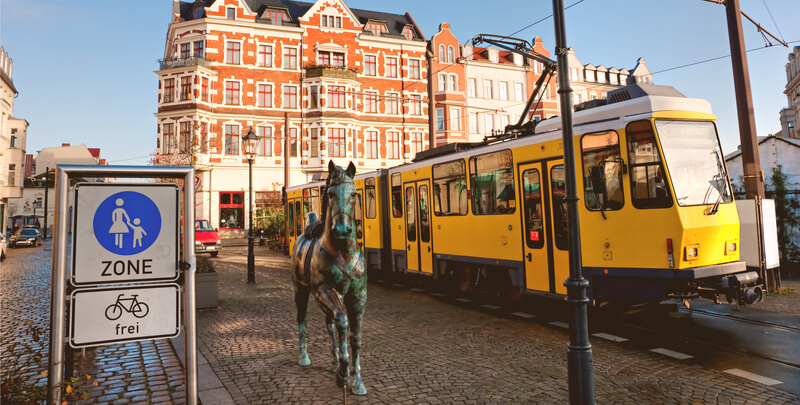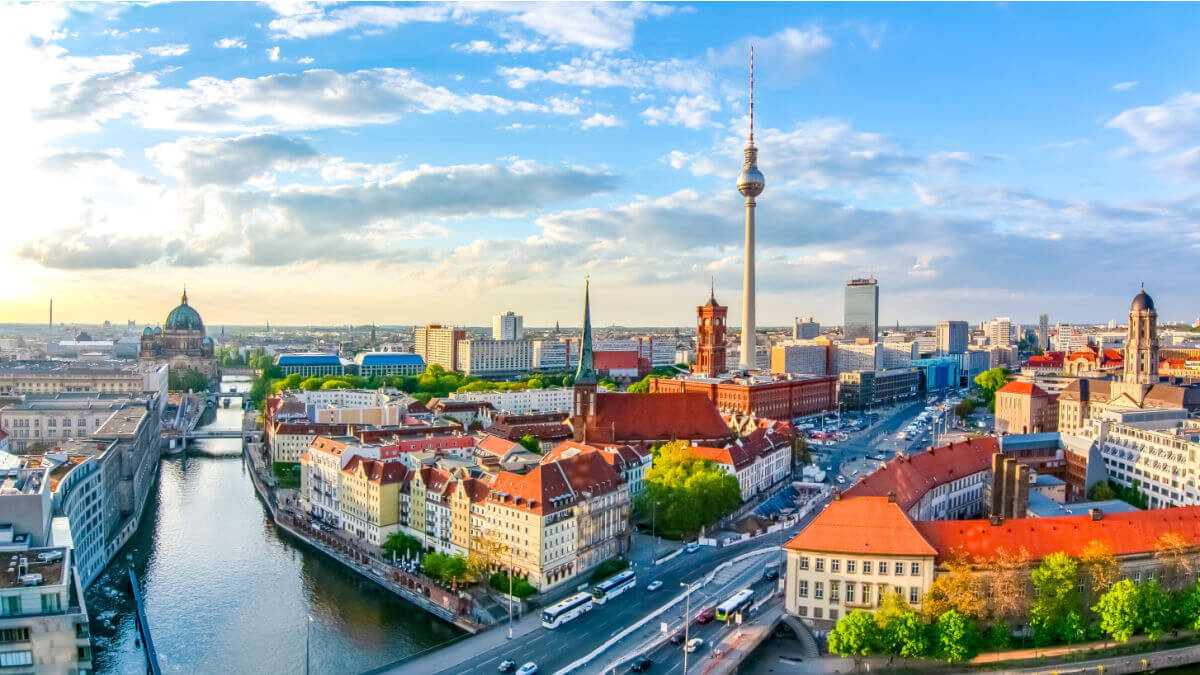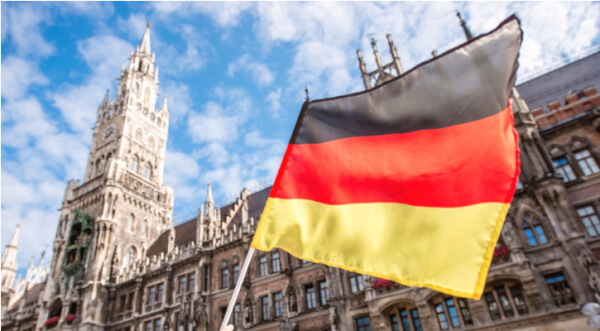How to transfer UK pension to Germany
Read our helpful guide on how to transfer a UK pension to Germany, including the steps, fees and taxes involved.

If you’re looking for a job in the arts, design and technology fields, and anyone hoping to get involved in an early-stage company, Berlin is the place to be. This city is a bustling and youthful one; full of creatives, startups, street art and experimental food. Berlin can be an exciting place to switch careers, start a new venture, or explore your creative talent.
It’s important to remember, however, that the city isn’t perfect for all types of jobs. Berlin isn't necessarily a good place to climb the corporate ladder or make a massive salary. While those types of jobs do exist in the East German city, they’re rare. You might be better off checking out Frankfurt for the finance scene, or Stuttgart for the automotive industry.
But if you’re looking for a vibrant, exciting city with lots of opportunities for young and creative talent, Berlin might be the place. So how do you get in on the scene? This guide will take you through 8 steps for finding a job in Berlin.
In Germany, foreigners are only required to obtain a single residence permit in order to work. Depending on your nationality, you may need to obtain a visitors permit before you enter the country. Germany’s Federal Foreign Office has published a comprehensive list of nationalities that do and don't require advance visas before traveling to the country.
The most common permit is the temporary residence permit, or Aufenthaltserlaubnis. Typically temporary residence permits are only good for a single year but they can be renewed indefinitely. In most cases, after five years expats are eligible for a permanent residence permit in Germany. To find more information about permits, check out the German consulate's website. Unfortunately, at the moment there’s no way to apply for a residence permit online; applications can be submitted at the German consulate in your area or at the Federal Foreign Office in Berlin.
As mentioned above, Berlin mightn’t be the right choice for you depending on your preferred industry. While jobs in areas like finance can be difficult to find, positions in other areas are plentiful. Some of the best industries for work in Berlin are:
Healthcare, including biotech
Media and creative; especially advertising, fashion and publishing
Transportation and logistics
Manufacturing
Service
For those whose skills are less industry-specific, Berlin’s startup scene spans many markets. If you enjoy working in fast paced, small-team environments; a startup may be the place for you.
As is the case in many cities, one of the best places to start looking for jobs in Berlin is online. While there are a plethora of niche websites you can try, it’s usually a good idea to start with the most popular ones, where you’ll find lots of job listings in a variety of sectors. Some of the biggest job sites in Berlin include:
Deutsche Startups (this site is in German)
You may have heard the term “Vitamin B” thrown around from time to time in business, but did you know that it came from a German expression? The whole term, vitamin beziehung, translates directly to “vitamin relationships,” but is better interpreted to mean the importance of having the right connections in business. Nearly half of open positions ultimately go to a candidate who was referenced or knew someone within the company. So if you’re looking to get hired in Berlin’s competitive job market, meeting local professionals is imperative.
While in-person job fairs are a great way to do this, you can also start meeting local expats by checking out Facebook groups or digital Meetups.
To meet other professionals online, LinkedIn is always a good option. However, German professional networking platform Xing is more prevalent and location specific.
Sometimes the most valuable connection you can make is with a recruiter. There are many reputable agencies across Berlin, but some of the best reviewed include:
Stuwex - for internships and entry-level positions
Job Point - a place where you can actually “shop” for jobs, as well as get help with your CV and cover letter
S&W - for jobs in a range of fields
AZ Personalkonzepte - for recruiting and coaching
Because the overall job market in Berlin is relatively small, you’ll be competing with a lot of candidates for the best roles. If you’re hoping to be awarded the position, you’ll need a CV and cover letter that really stand out.
For help with general resume writing, a good place to start is Monster.com and CareerPerfect. If you speak German, it’s worth having a dual language CV; but make sure your translation is perfect. It can be worthwhile to bring in a professional translator to double check. You can easily find translation freelancers on sites like Upwork and Fiverr. If you don’t speak German, don’t submit a German language CV or cover letter; potential employers won't be impressed if you show up at an interview with no ability to speak the language you applied in.
While German CVs typically follow the same structure as those from other countries, there are a couple of differences due to German business culture. First, it’s relatively common to include a picture of yourself on the top of your resume. That being said, if you don’t have a professional headshot, you may be better off without one. Using a selfie or a picture from your vacation mightn’t create a good first impression.
Also note that cover letters remain an important part of a job application in Germany. In Berlin, you may find that your cover letter actually counts more than your CV.
| Create your resume by choosing the best resume format from our free resume templates and customize it with your history. |
|---|
Being well prepared for your interview is a must-do in any country. While givens like doing your research and preparing questions hold true in Germany, there are a couple of things that can make or break an interview in Berlin.
Germans are known worldwide for their timeliness, and it’s not just a stereotype. Even being “right on time” can be a dealbreaker at a German company. Try to be at least 10 minutes early.
While in other countries it’s not practice to be ask personal questions in a job interview, the same can’t be said for Berlin. German interviewers may ask you whether you’re married, whether you’re pregnant or planning to be, and your reasons behind moving to the city.
Getting a job in Berlin is the hard part. If you’ve obtained one and are ready to make the move - congratulations!
For tips on moving to Berlin, check out Moving to Berlin's guide. Another great article highlights the most helpful apps for your new life in Berlin.
Once you accept a position and make your move to Berlin, you’ll soon find the need to either send or receive Euros. If you plan to open a bank account in Berlin or know someone with a bank account there, consider using Wise to get the fairest deal on your transfer. Not only does Wise use the real mid-market exchange rate to convert your money, but your money is received and sent via local bank transfers in both your home country and in Germany, thus resulting in lower fees on your end.
Good luck!
*Please see terms of use and product availability for your region or visit Wise fees and pricing for the most up to date pricing and fee information.
This publication is provided for general information purposes and does not constitute legal, tax or other professional advice from Wise Payments Limited or its subsidiaries and its affiliates, and it is not intended as a substitute for obtaining advice from a financial advisor or any other professional.
We make no representations, warranties or guarantees, whether expressed or implied, that the content in the publication is accurate, complete or up to date.

Read our helpful guide on how to transfer a UK pension to Germany, including the steps, fees and taxes involved.

Thinking of taking the leap and moving to Germany? You’re not alone, since over 80,000 Brits already call Germany their home.¹ If you like living in a stable...

A guide that explains the German residence permit, how it works, who can apply, how to apply and costs.

Are you or your partner expecting? While this is meant to be a very exciting time in your life, sometimes medical expenses and navigating public or private...

Holidays in Germany are celebrated differently than in many parts of the world. Germans take their holidays very seriously, with celebrations that are steeped...

Germany is so much more than sausages and beer. The country boasts incredibly low unemployment, a high quality of life, and a wonderful mix of history,...